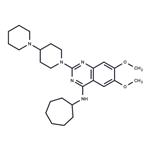Biological Activity
c 021 dihydrochloride is a potent antagonist of ccr4 with ic50 values of 0.039 and 0.14 μm for inhibition of chemotaxis in mouse and human, respectively [1].cc chemokine receptor 4 (ccr4) is a g protein-coupled receptor and is a receptor for the cc chemokines, which play an important role in the development and function of the immune system.c 021 dihydrochloride is a potent ccr4 antagonist. c 021 dihydrochloride potently inhibited functional chemotaxis in mice and human with ic50 values of 0.039 and 0.14 μm, respectively. in the gtpγs-binding assay, c 021 dihydrochloride was active with ic50 value of 0.018 μm [1].treatment mice with azoxymethane (aom), which induced hepatic encephalopathy, aom significantly increased microglia activation and the concentrations of ccl2 in the liver, serum, and cortex. c 021 dihydrochloride reduced liver damage and significantly improved the neurological outcomes. also, c 021 dihydrochloride reduced microglia activation and phosphorylation of erk1/2, and inhibited aom-induced cytokine upregulation [2].
References
[1]. yokoyama k, ishikawa n, igarashi s, et al. potent and orally bioavailable ccr4 antagonists: synthesis and structure-activity relationship study of 2-aminoquinazolines. bioorg med chem, 2009, 17(1): 64-73.
[2]. mcmillin m, frampton g, thompson m, et al. neuronal ccl2 is upregulated during hepatic encephalopathy and contributes to microglia activation and neurological decline. j neuroinflammation, 2014, 11: 121.
![2-[1,4'-Bipiperidin]-1'-yl-N-cycloheptyl-6,7-dimethoxy-4-quinazolinaminedihydrochloride Structure](https://www.chemicalbook.com/CAS/GIF/864289-85-0.gif)
